User Stories¶
ALL Network Policy API resources and future API developments should start with a well-defined and intentional user story(s).
AdminNetworkPolicy + BaselineAdminNetworkPolicy¶
v1alpha1 User Stories¶
The following user stories drive the concepts for the v1alpha1 version of the
ANP and BANP resources. More information on how the community ended up here
can be found in the API KEP
and in the accompanying KEP PR
Story 1: Deny traffic at a cluster level¶
As a cluster admin, I want to apply non-overridable deny rules to certain pod(s) and(or) Namespace(s) that isolate the selected resources from all other cluster internal traffic.
For Example: In this diagram there is a AdminNetworkPolicy applied to the
sensitive-ns denying ingress from all other in-cluster resources for all
ports and protocols.
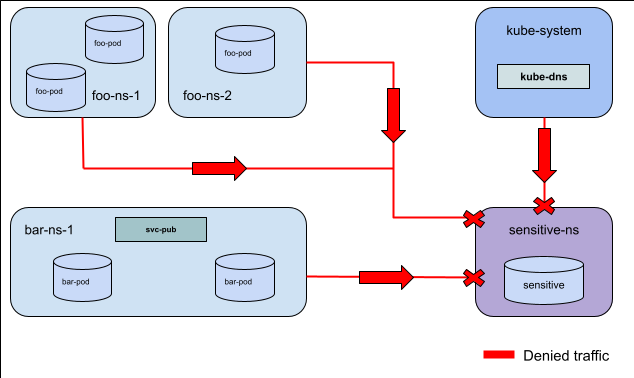
Equivalent API Object
apiVersion: policy.networking.k8s.io/v1alpha1
kind: AdminNetworkPolicy
metadata:
name: cluster-wide-deny-example
spec:
priority: 10
subject:
namespaces:
matchLabels:
kubernetes.io/metadata.name: sensitive-ns
ingress:
- action: Deny
from:
- namespaces:
namespaceSelector: {}
name: select-all-deny-all
Story 2: Allow traffic at a cluster level¶
As a cluster admin, I want to apply non-overridable allow rules to
certain pods(s) and(or) Namespace(s) that enable the selected resources
to communicate with all other cluster internal entities.
For Example: In this diagram there is a AdminNetworkPolicy applied to every
namespace in the cluster allowing egress traffic to kube-dns pods, and ingress
traffic from pods in monitoring-ns for all ports and protocols.
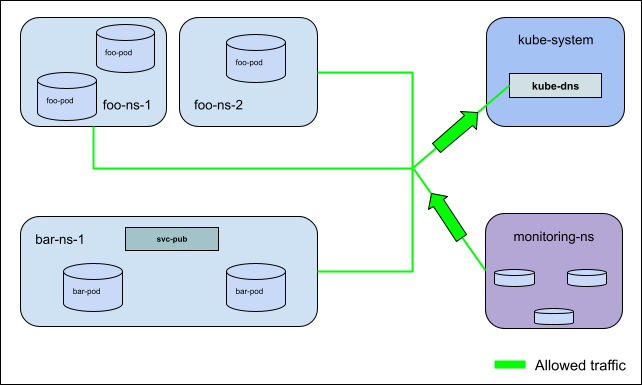
Equivalent API Object
apiVersion: policy.networking.k8s.io/v1alpha1
kind: AdminNetworkPolicy
metadata:
name: cluster-wide-allow-example
spec:
priority: 30
subject:
namespaces: {}
ingress:
- action: Allow
from:
- namespaces:
namespaceSelector:
matchLabels:
kubernetes.io/metadata.name: monitoring-ns
egress:
- action: Allow
to:
- pods:
namespaces:
namespaceSelector:
matchlabels:
kubernetes.io/metadata.name: kube-system
podSelector:
matchlabels:
app: kube-dns
Story 3: Explicitly Delegate traffic to existing K8s Network Policy¶
As a cluster admin, I want to explicitly delegate traffic so that it skips any remaining cluster network policies and is handled by standard namespace scoped network policies.
For Example: In the diagram below egress traffic destined for the service svc-pub in namespace bar-ns-1 on TCP port 8080 is delegated to the k8s network policies implemented in foo-ns-1 and foo-ns-2. If no k8s network policies touch the delegated traffic the traffic will be allowed.
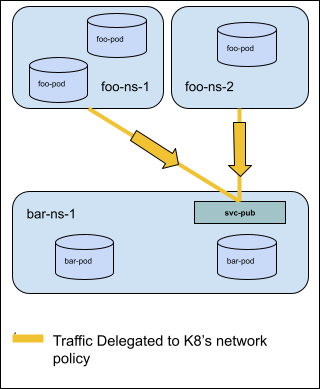
Equivalent API Object
apiVersion: policy.networking.k8s.io/v1alpha1
kind: AdminNetworkPolicy
metadata:
name: pub-svc-delegate-example
spec:
priority: 20
subject:
namespaces: {}
egress:
- action: Pass
to:
- pods:
namespaceSelector:
matchLabels:
kubernetes.io/metadata.name: bar-ns-1
podSelector:
matchLabels:
app: svc-pub
ports:
- portNumber:
protocol: TCP
port: 8080
Story 4: Create and Isolate multiple tenants in a cluster¶
As a cluster admin, I want to build tenants in my cluster that are isolated from each other by default. Tenancy may be modeled as 1:1, where 1 tenant is mapped to a single Namespace, or 1:n, where a single tenant may own more than 1 Namespace.
For Example: In the diagram below two tenants (Foo and Bar) are defined such that all ingress traffic is denied to either tenant.
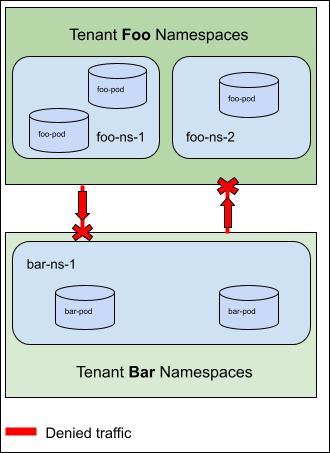
Equivalent API Object
apiVersion: policy.networking.k8s.io/v1alpha1
kind: AdminNetworkPolicy
metadata:
name: tenant-creation-example
spec:
priority: 50
subject:
namespaces:
matchExpressions: {key: "tenant"; operator: Exists}
ingress:
- action: Deny
from:
- namespaces:
# This user story is currently not implementable.
# See https://network-policy-api.sigs.k8s.io/npeps/npep-122/ for more details.
This can also be expressed in the following way:
apiVersion: policy.networking.k8s.io/v1alpha1
kind: AdminNetworkPolicy
metadata:
name: tenant-creation-example
spec:
priority: 50
subject:
namespaces:
matchExpressions: {key: "tenant"; operator: Exists}
ingress:
- action: Pass # Pass inter-tenant traffic to any defined NetworkPolicies
from:
- namespaces:
# This user story is currently not implementable.
# See https://network-policy-api.sigs.k8s.io/npeps/npep-122/ for more details.
- action: Deny # Deny everything else other than same tenant traffic
from:
- namespaces:
namespaceSelector: {}
Story 5: Cluster Wide Default Guardrails¶
As a cluster admin I want to change the default security model for my cluster, so that all intra-cluster traffic (except for certain essential traffic) is blocked by default. Namespace owners will need to use NetworkPolicies to explicitly allow known traffic. This follows a whitelist model which is familiar to many security administrators, and similar to how kubernetes suggests network policy be used.
For Example: In the following diagram all Ingress traffic to every cluster resource is denied by a baseline deny rule.
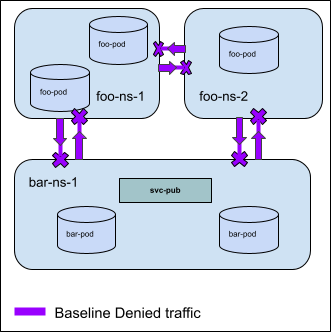
Equivalent API Object
apiVersion: policy.networking.k8s.io/v1alpha1
kind: BaselineAdminNetworkPolicy
metadata:
name: default
spec:
subject:
namespaces: {}
ingress:
- action: Deny # zero-trust cluster default security posture
from:
- namespaces:
namespaceSelector: {}